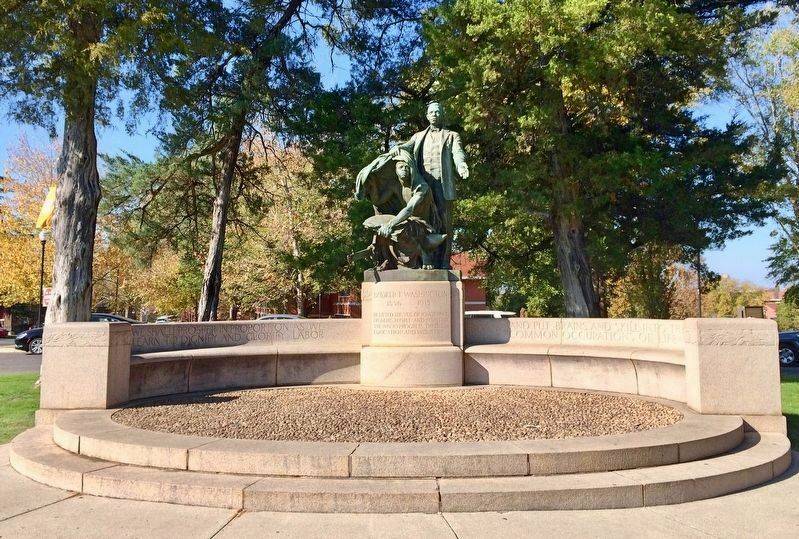Summary
The “Lifting the Veil of Ignorance” series of student social justice essays, which were developed from the students’ social work research proposals, is an anthology of undergraduate authors’ viewpoints on various topics related to social justice using a social work perspective to approach addressing injustices. It is important to hear from undergraduate students, particularly those in social work whose education competencies and professional practice values have important implications for social justice. The National Association of Social Workers (NASW) Code of Ethics (2017) places a value on social justice and calls on social workers to challenge social injustice.
The essays presented address students’ views on various issues associated with serious societal issues. The overall intent of this compilation of essays is to raise awareness about social justice and how to address injustices from a social work perspective.
Context
A statue of Tuskegee University’s co-founder Booker T. Washington is prominently placed on campus. The inscription on the statue reads, “He lifted the veil of ignorance from his people and pointed the way to progress through education and industry.” Most of us at Tuskegee refer to this fine landmark as “The Lifting the veil statue.” It is the inspiration for this essay series.
The theoretical framework associated with this compilation is John Rawls (1971) Theory of Justice. Rawls (1921-2002) was an American political philosopher whose ideas on Justice as fairness were at the center of his theory of justice for a liberal society. Similarly, University co-founder Booker T. Washington suggested that “lifting the veil of ignorance” from those previously enslaved by providing formal education and encouraging entrepreneurship could contribute significantly to creating social and economic justice for minorities and vulnerable populations.
As a scholar and a social work educator, I am enthusiastic about social justice and equality for diverse individuals and organizations. As a licensed social worker, associate professor/Department Chair of Social Work, and researcher, I enjoy sharing with students the influence of research and teaching them how to use data for real-world solutions. The Department of Social Work at Tuskegee University features a course sequence in which students in internship take the research methods course concurrently to assist them with preparing a proposal for research about their population of interest or a topic related to their internship field placement that can be conducted during internship or post-graduation.
The students’ papers are relevant to social work education, practice, and wellness and healthcare in general. They have a heightened relevance in the current times of turmoil, with social justice issues having been brought to the forefront of the nation and social workers being called to action in response to social injustices through using ethical social work values, principles, and competencies to make positive social change.
The Tuskegee University Department of Social Work intends to publish with Social Publishers Foundation (https://socialpublishersfoundation.org/) a series of essays on topics focused on distributive social justice, which involves the ways in which resources are allocated in society and is closely related to the social work profession’s mission of promoting human rights, and social and economic justice. The Lifting the Veil of Ignorance: A Social Justice Perspective series of essays may empower others in the social work profession or those interested in advocacy with new ideas or may point towards the discovery of new knowledge in relation to addressing social injustices.
Lifting the Veil of Ignorance: Social Justice Perspectives
Social Justice is a core social work value in the professional practice of social work. While social work’s focus is to achieve the goals of clients and colleagues, social justice for all is one of the six core values of practice in the NASW Code of Ethics. The Code of Ethics preamble states, “Social Workers promote social justice and social change with and on behalf of clients… Social Workers are sensitive to cultural and ethnic diversity and strive to end discrimination, oppression, poverty, and other forms of social injustice” (NASW Code of Ethics, 2018). Barker (2021) defines social justice as “an ideal condition in which all of the members of the society have the same basic rights, protections, opportunities, obligations, and social benefits.” (Social Work Dictionary, pp. 404-405). The forthcoming series of social justice essays is a collection from an undergraduate Historically Black College and University (HBCU) social work course. Authors will include students enrolled in the SOWK 301 Research Methods in Human Services course at Tuskegee University College of Arts and Sciences, Department of Social Work.
Social Work education is competency-based, and the course essay assignment utilized the 2022 Educational Policy Accreditation Standards (EPAS) by Council on Social Work Education (CSWE) that address two competencies in the conceptual framework: Competency 2: Advance Human Rights and Social, Racial, Economic, and Environmental Justice and Competency 4: Engage in Practice-Informed Research and Research-Informed Practice.
In addition, when viewing social work advocacy as it relates to social justice, Competency 3: Engage Anti-Racism, Diversity, Equity, and Inclusion (ADEI) in Practice is a part of addressing forms of social injustice with individuals, groups, families, communities, organizations, research, policy, and globally. In keeping with NASW’s social justice priorities, various initiatives seek to strengthen and empower those within impoverished and indigent communities with a commitment to economic and social justice ideals, including fairness, equity, and equality through areas of service such as outreach, grassroots mobilization, lobbying, community development, and public awareness efforts. The course assignment for a research proposal in an essay format helps students develop attitudes and skills that can contribute to strengthening public awareness about social justice issues and addressing social injustices from a social work perspective. In the long run, it is my hope that the student essays will provide a narrative about social justice through the lens of social work education and practice.
As a part of their coursework, students were asked to develop an essay on a topic by introducing a problem, providing a rationale for research based on a review of literature, and discussing their social work perspectives on social justice as it relates to their selected topic. In addition, the essay explores how research might address the relevant social injustice and be applied to social work practice.
During the course, reflections on possible solutions for social injustices are encouraged. Some of the prompts for these reflections include: what arguments are made for the duty to pursue social justice? What is required by the NASW Code of Ethics? Are there alternative concepts of social justice? Could there be a non-utopian conception of social justice for a resolution of differences? How do social workers address the need for mutual respect of diverse worldviews about social justice? Against the background of these, and other, reflections, the student essays set out to address a specific injustice through what we hope is a holistic approach to advocacy and application of social work competencies, values, standards, and principles to enhance the well-being of diverse and vulnerable populations. The student essays in this series represent efforts to begin finding answers to very difficult issues that can be seen all around us. The quest to address social injustices and to lift the veil of ignorance points the way towards a more just world, which social work along with helping professions in general have a responsibility to bring about.
In addition to my brief introductory essay, the first student essay in the series is by Kendahl Brown, now a Senior in Social Work at Tuskegee. Ms. Brown’s paper examines Black maternal mortality rates in the Southern United States. Her paper discusses crucial intersections between social work, healthcare, social injustices and pathways towards social justice. A reader can only hope that this determined student has an opportunity to carry forward the ideas she presents for addressing gaps in healthcare.
Overall, my hope is that readers will find that the students’ essays represent diverse conceptualizations of social justice from popular perspectives about what social justice is or should be through their lenses of social justice and social work practice as they understand it. The essays support the recognition that people’s views of social injustice differ and that there are diverse views of what constitutes justice.
I hope readers will be inspired to a call to action for social justice and be a lifter of the veil by joining a cause, contributing funds to campaigns, joining an advocacy group, attending lobbying events, and researching and writing about ways to address social injustice and contribute to the body of knowledge about social justice.
Sources
Barker, R. L. (2021). The social work dictionary (5th ed.). Washington, DC: NASW Press.
Council on Social Work Education (2022). Educational policy and accreditation standards. Alexandria, VA: Author.
Rawls, J. (1971). A theory of justice. Cambridge, MA: Harvard University Press.
National Association of Social Workers. (2017). NASW code of ethics. Retrieved March 30, 2023, from https://www.socialworkers.org/About/Ethics/Code-of-Ethics/Code-of-Ethics-English
To cite this work, please use the following reference:
Jones, A. (2024, February 12). Lifting The Veil Of Ignorance: A Social Justice Perspective. Social Publishers Foundation. https://www.socialpublishersfoundation.org/knowledge_base/lifting-the-veil-of-ignorance-a-social-justice-perspective/

